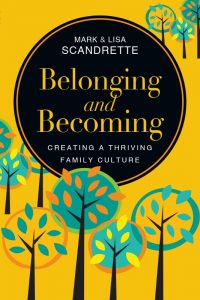This reflection is excerpted from the book, Belonging and Becoming: Creating a Thriving Family Culture, chapter 4 – “A Thriving Family Discovers a Common Story”
I’m a sucker for a good story. Actually, sucker doesn’t quite capture it. I use stories to make sense of life: made-up stories, factual stories and stories that are utterly true without having actually happened. I’m convinced that storytelling is one of the key things that makes us human and allows us to create a shared humanity. This means stories are incredibly powerful.
 The stories we tell ourselves shape how we interact with the world and how we approach the challenges and opportunities in our lives. We all tell ourselves both true and false stories about our place in the world. Learning to differentiate between the true and false narratives enables us to engage God and find our true selves.
The stories we tell ourselves shape how we interact with the world and how we approach the challenges and opportunities in our lives. We all tell ourselves both true and false stories about our place in the world. Learning to differentiate between the true and false narratives enables us to engage God and find our true selves.
Having false narratives is part of being human. We struggle with anxiety, fear, envy, perfectionism, anger, etc., because these are human responses to the uncertainty of being alive. However, when these responses go unchecked, they become part of a story we tell ourselves that keeps us from growing and living more fully in the kingdom of God.
It’s a lot of work to change the narrative you tell yourself. It takes effort just to identify what that narrative is. Growing up, we were taught to start this process by understanding the biggest, truest things about our story. We were given opportunities from a very young age to process and discuss the larger story of God and Jesus as told in the Bible. As a family, we read Scripture together at least three or four times a week. We were encouraged to ask questions and to share our interpretation of the message being communicated.
Our parents attempted to present us with what they believed to be the most important truths about the story of God’s relationship with humans: that we’re deeply and unconditionally loved, that Jesus shows us a better way of being, that we’re called to love others unconditionally as we’re loved, etc. They also encouraged us to discuss these truths and the passages that contained them. Which gave us ownership of our personal beliefs and allowed us to build an ever-growing concept of our independent spirituality.
As an adult, I don’t think I fully understand how grounding it has been to find myself in the larger context of the grand story of God’s relationship with humanity. It gives me a sort of baseline context for who I am and provides a reference for understanding when I’m struggling with a false narrative. It’s helpful to confront those false narratives by asking, “How is this way of thinking preventing me from living into the larger, truer story?”
 Hailey Joy Scandrette is Founder and Editor in Chief of Ignighted Magazine, an online magazine and community of people ages 18-30 seeking to follow the teachings and actions of Jesus through incarnational living. She is also the daughter of Mark and Lisa Scandrette, authors of Belonging and Becoming: Creating a Thriving Family Culture. This piece is excerpted from the book (pp. 101-103) in the chapter, “A Thriving Family Discovers a Common Story”.
Hailey Joy Scandrette is Founder and Editor in Chief of Ignighted Magazine, an online magazine and community of people ages 18-30 seeking to follow the teachings and actions of Jesus through incarnational living. She is also the daughter of Mark and Lisa Scandrette, authors of Belonging and Becoming: Creating a Thriving Family Culture. This piece is excerpted from the book (pp. 101-103) in the chapter, “A Thriving Family Discovers a Common Story”.
